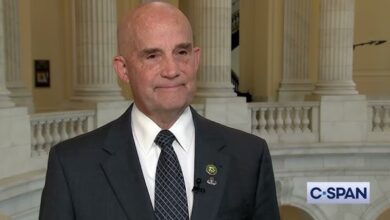Backlash grows over Trump’s summit seeking peace with Russia
Following Monday’s historic summit and bilateral talks between President Donald Trump and Russian President Vladimir Putin, the two leaders held a joint press conference at their summit in Helsinki, Finland.
Both men appeared to be optimistic about future relations between the US and Russia. That’s no small thing. Both countries still have thousands of nuclear tipped missiles pointed at each other. Trump has repeated numerous times that it is no bad thing to talk to your enemy, or you risk misunderstanding and possible war.
“Our relationship has never been worse; however, that changed as of four hours ago,” Trump told reporters.
President Trump had referred to Russia as merely “a competitor” just days before meeting Putin, but some say Russia is actually an aggressor and has even committed acts of war against the US and other countries with its cyber-attacks on the US election in 2016 and its efforts to conquer neighboring countries like Georgia and Ukraine.
But Trump made it clear at the summit he believed the Russian leader when Putin denied his country had any hand in meddling in US political affairs.
“He just said it’s not Russia. I will say this: I don’t see any reason why it would be,” Trump said.
As to charges of collusion between the Trump campaign and the Russian government, the president dismissed them as being ludicrous, saying he beat Democratic contender Hillary Clinton fair and square. His assessment is supported by the current Mueller investigation, now in its second year, which has not found any collusion but rather indicted individuals for alleged crimes that allegedly occurred years before they joined the Trump campaign.
“We ran a brilliant campaign, and that’s why I’m president,” Trump declared.
Meanwhile, to the dismay of many of his critics, Trump is adamant about his attempts to improve diplomatic ties with the Kremlin, insisting the two nations must find ways to “cooperate in pursuit of shared interests.”
And the president went on to blame both Russia and the US for rising tensions between the two countries regarding charges of election meddling.
“I hold both countries responsible. I think that the United States has been foolish. We’ve all been foolish,” Trump said. “We should have, frankly, had this dialogue a long time ago. I think that we’re all to blame. I think that the United States has now stepped forward along with Russia.”
But CBN News‘ David Brody predicts those words from the summit might land Trump in hot water.
“Let’s be honest,” Brody said. “If Barack Obama had uttered those words the conservative movement and the Republican Party would be up in arms. That’s a real problem for this president to say that on the national stage.”
Trump has repeatedly denied that there was any collusion between anyone in his campaign and the Russian government. But the question of collusion is different from the question of Russian hacking or election meddling, for which US investigators recently indicted 12 Russians.
National Security Correspondent Erik Rosales agreed with Brody’s assessment, noting, “He did not specifically come out and denounce Russia… I mean, we have intelligence reports saying Russia was behind it. We’re talking about a Russian leader who knows all about cybersecurity – he was a Russian intelligence officer himself.”
Meanwhile, US lawmakers and political observers on both sides are warning Trump not to trust Putin. House Speaker Paul Ryan said after the Trump-Putin news conference there’s “no question” Russia interfered in the 2016 election and “remains hostile to our most basic values and ideals.”
But is trying to sway an election all that uncommon among modern nations including the United States?
Senator Rand Paul says U.S. lawmakers on both sides of the aisle better think twice before they point fingers and also think the hands of American intelligence is clean.
“I think really we mistake our response if we think it’s about accountability from the Russians. They’re another country; they’re going to spy on us,” the Kentucky Republican said on CNN’s “State of the Union,” a day before President Donald Trump’s scheduled meeting with Russian President Vladimir Putin in Helsinki.
“We all do it. What we need to do is make sure our electoral process is protected,” Paul said. “They’re not going to admit it in the same way we’re not going to admit we were involved in the Ukrainian elections or the Russian elections.”
Paul also blamed former President Barack Obama for not doing more to halt Moscow’s aggression, echoing a series of tweets from Trump on Saturday.
“I wish President Obama had been more aggressive in pursuing it,” Paul said.
One thing not discussed in the media is the fact that the Obama administration illegally funneled money into the campaigns of political opponents of Israeli Prime Minister Benjamin Netanyahu. It was an all-out effort to alter the outcome of a foreign election.
So, meddling is not all that uncommon–even for American presidents.
But its hard to ignore Russia and the tyranny Putin has installed under the banner of democracy.
Middle East expert Joel Rosenberg used a stark term to describe Putin, saying “he’s evil.”
“I don’t believe in walking into the room with a world leader who’s an enemy, who’s a strategic threat unless you have a specific game plan,” Rosenberg said.
Rosenberg, like many observers, is not privy to the inner-workings of U.S. foreign policy. The administration was not likely to share its “game plan” publicly before the meeting and the media may be assuming there was no plan.
The summit comes right after Trump met with NATO leaders, taking a hard stance on demanding they pay their fair share in the military defense alliance that exists to hold Russia and other rogue actors in check.
Media outlets assumed there was no game plan before the NATO meeting as well, or at worst that Trump would withdraw from the organization all together.
The opposite happened. Trump gained what he wanted: more money from member states and a strengthened NATO to stand up to Russia.
Trump says getting along with Russia is a good thing, but should the US try to just get along with a leader who has a history of tyrannical abuses of power? One would need to look at history for the answer. Roosevelt met with Stalin and the U.S. even offered the Soviets aid in an effort to win WWII. Reagan met with Soviet leader Gorbachev and subsequent negotiations reduced the number of nuclear weapons each had in their arsenals by 70 percent.
Time will tell if summit with Putin will ultimately lead to a safer world.
–CBNEWS and wire services.








